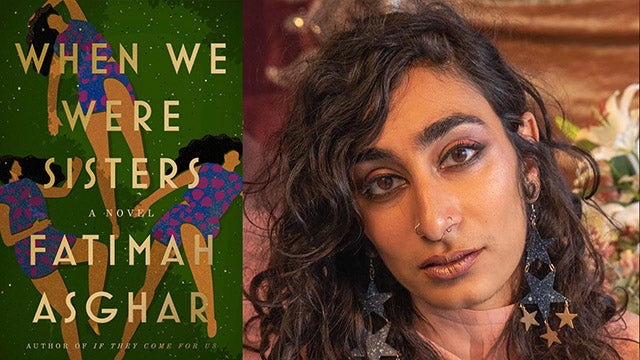In December, Aspen Words announced the longlist for the sixth annual Aspen Words Literary Prize, a $35,000 award recognizing a work of fiction that addresses a vital social issue. The selected books explore the climate crisis, racism, xenophobia, and mental health, and feature a range of dynamic voices. While the jury works on selecting a shortlist, Aspen Words chatted with the nominees about their work, how they view their role as a writer in this cultural and political moment, and the best piece of writing advice they’ve received.

Fatimah Asghar is a poet, filmmaker, educator, and performer. They are the writer and co-creator of Brown Girls, an Emmy-nominated web series that highlights friendships between women of color. When We Were Sisters traces the intense bond of three orphaned siblings who, after their parents die, are left to raise one another. The book examines the bonds and fractures of sisterhood, names the perils of being three Muslim American girls alone against the world, and illustrates how those who’ve lost everything might still make homes in one another.
What perspectives or beliefs are you trying to challenge with your book?
There is so much literature and art in the western canon that’s about orphaning. It’s alluring: orphaning; the idea that from nothing, with everything stacked against you, you were able to make a life for yourself. I think particularly in the warped sense of the American Dream, orphaning is particularly alluring. This entire nation is founded on the lie that an orphaned people came to this uninhabited land and pulled themselves up by their bootstraps, that being born into a kind of nothingness and a kind of grief allows you to chart out a survival that deserves applause.
As an actual orphan, I often found those narratives disenchanting and like they felt so far from the lived reality that I knew. So these kids go through all this trauma and then are able to create healthy relationships when they’re older? That just doesn’t feel fully realistic. And so I really wanted to challenge that by getting into the minutia of these ordinary orphans: what does the strain look like on their own relationships when they have to raise each other? What does it mean to build love when there aren’t a lot of healthy models around you? What does it mean to build a life after so much early grief has happened?
Can you share an experience that taught you the power of language?
There are so many things that have made me really experience the power of language. For me, when I’ve experienced things that are particularly traumatic, it’s been really hard for me to actually name them, discuss them, or write them. For a long time, I didn’t tell anyone that I was an orphan precisely because of that—I wouldn’t talk about my parents at all, or just would kind of sidestep any conversation that really had to do with my upbringing. I think that severely impacted my ability to form relationships because it was so hard to name some of the tightness around my heart and to let people in. Slowly, over time, I started to name those things. But the way that I named them was through poetry, through language that felt like it so deeply needed to escape me. And through that process, I felt a deep transformation happening to me—that through the naming, I was able to make sense of the world around me and the world within me, and I could carve a small place for myself.
How did the process of writing this book change you?
This book really changed me on a very deep level. Even though it is fiction, it brought me face to face with a lot of trauma and narratives that I had been carrying since childhood. It helped me reclaim parts of myself that I left behind. It allowed me to have empathy for people that I had previously written off. And so, it led to a lot of discovery. And also, once I was able to tell the story of aloneness and isolation and validate that, and the pain, I was also able to see the beauty of connection and people just trying to live in impossible situations and create moments together of beauty.
Which of the characters did you find most difficult to write?
I found the uncle quite difficult to write. With every character you need to find empathy, some reason they’re doing the things they are doing. And I found his character and his wife’s character quite hard, it took me many drafts to fully be able to give them empathy. And while it was challenging, it was also a very necessary step in terms of building out well-rounded characters and thinking through important things around forgiveness, acceptance, and empathy.
Some say writers should write the book they need to read. Why did you need this book, and what do you hope it says to others?
This is definitely the book I needed to read, even if it’s not always the book that I liked. It’s not a happy-go-lucky book or one that’s brimming with joy—it just is what it is. It makes you feel the feelings of the main character—the desperation, the low self-worth, the grief, the love. And all of that is valid. I think so often we’re looking for a neat ending. And sometimes it’s really important to have something that doesn’t end neatly, where the characters don’t behave neatly, where they get to just be. And being South Asian and Muslim and queer and femme, I never really saw characters that looked like me or inhabited worlds that I inhabited. And had the nuance of the people that existed around me. And it was important for me to read a book that had that, that still was fueled by love, even if that love wasn’t perfect or wasn’t always what we’re used to reading or seeing when we think of love.
What was the last book you couldn’t put down?
There are so many books that I’ve read recently that I’ve been really moved by—The Spirit of Intimacy by Sobonfu Some; The World Keeps Ending and The World Goes On by Franny Choi, Girls Who Never Die by Safia Elhillo, and I’ve been reading the Brother Sister Plays by Tarell Alvin McCraney. I’m also re-reading Loose Woman by Sandra Cisneros.


